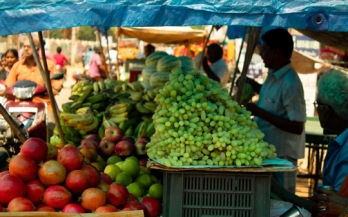Joana Celestina is a vendor at the central market in Mozambique: "After losing my husband, and with a family to look after, I had to wipe away my tears and battle to provide for my family. I realised I needed to be the breadwinner of the family, and I became a vendor at the Munhava Market in Beira city".
Joana, like many other women we spoke to at the Munhava Central Market is a vendor in one of the typically large open-air stalls, or traditional ‘wet’ markets, that sells fresh meat, fish, and vegetable goods to local buyers. She relies on her business to support her family, who are wholly dependent on her to provide, survive, and thrive. She is the sole provider of her household, without any education, and under pressure from gender stigma: she found her solution in the informal economy.
According to the Household Budget Survey (IOF 2019/20), just over 30% of households in the Sofala Province in Mozambique were headed by women. In this rural area, people start and form families from a very young age. Between the ages of 20 and 49, the percentage of male-headed households are higher than those of female-headed. However, after the age of 50 this statistic reverses. This trend could be related to higher male mortality rates.
It was from there that I realised that I needed to be the breadwinner of the family, and I became a vendor at the Munhava Market in Beira city.
In 2020, following partial and, in some cases complete, destruction of buildings from cyclones and tropical storms such as Eloíse and Chalane, many traditional markets were seriously damaged in the central region of Mozambique, especially the southern seaport province of Sofala.
Later, under COVID19 restrictions, GAIN with its "Reconstruction of Food Systems Post-Cyclone IDAI & Kenneth in Mozambique" project rebuilt three large open-air stalls, or traditional fresh food markets in Joana’s city, as well as Massamba and Central. The project was funded by the government of the Netherlands, in partnership with the city of Beira, in Sofala.
The Munhava Market, which hosts the largest number of fresh food vendors in Beira city, also benefited from a second GAIN intervention, called "Markets for the Future". It was a scheme implemented under the "Keeping Nutritious Food Markets Working (KFMW)" programme, run by GAIN during the pandemic.
GAIN aimed at making the Munhava Market in Beira city a better place to work and shop. We did this by acquiring and installing cold chain equipment such as an ice maker, meat cutter, and cold storage to keep food fresh. We also focused on improving the lighting via a solar energy system, improving the water quality, and upgrading the hygiene and sanitation system. We also set up a waste management system for rubbish and trash to be disposed of easily.
All these changes contributed to improving food safety for the people who sell and buy food in the market. It aimed at making the food safer to eat, reducing the risk of diseases for buyers, and for the people working at the food stalls. GAIN and our partners also wanted to make the market a nicer and safer place to be, so more people would want to shop there.
These GAIN projects mean Joana, and all the other women working at the Munhava Market in Beira city, can thrive safely. They can generate income for themselves and their families, and feel empowered to champion their rights and improve their livelihoods.
Join them this International Women’s Day by sharing their story.
#EmbraceEquity.
